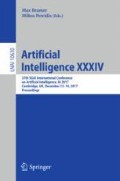Abstract
In this paper, a general purpose multi-agent classifier system based on the blackboard architecture using reinforcement Learning techniques is proposed for tackling complex data classification problems. A trust metric for evaluating agent’s performance and expertise based on Q-learning and employing different voting processes is formulated. Specifically, multiple heterogeneous machine learning agents, are devised to form the expertise group for the proposed Coordinated Heterogeneous Intelligent Multi-Agent Classifier System (CHIMACS). To evaluate the effectiveness of CHIMACS, a variety of benchmark problems are used, including small and high dimensional datasets with and without noise. The results from CHIMACS are compared with those of individual ML models and ensemble methods. The results indicate that CHIMACS is effective in identifying classifier agent expertise and can combine their knowledge to improve the overall prediction performance.
Access this chapter
Tax calculation will be finalised at checkout
Purchases are for personal use only
References
Langley, P., Simon, H.A.: Applications of machine learning and rule induction. Commun. ACM 38(11), 54–64 (1995)
Hoffmann, A.G.: General limitations on machine learning. In: ECAI, pp. 345–347 (1990)
Wolpert, D.H.: The supervised learning no-free-lunch theorems. In: Roy, R., Köppen, M., Ovaska, S., Furuhashi, T., Hoffmann, F. (eds.) Soft Computing and Industry: Recent Applications, pp. 25–42. Springer, London (2002). https://doi.org/10.1007/978-1-4471-0123-9_3
Işın, A., Direkoğlu, C., Şah, M.: Review of MRI-based brain tumor image segmentation using deep learning methods. Procedia Comput. Sci. 102, 317–324 (2016)
LeCun, Y., Bengio, Y., Hinton, G.: Deep learning. Nature 521(7553), 436–444 (2015)
Dietterich, T.G.: Ensemble methods in machine learning. In: Kittler, J., Roli, F. (eds.) MCS 2000. LNCS, vol. 1857, pp. 1–15. Springer, Heidelberg (2000). https://doi.org/10.1007/3-540-45014-9_1
Drucker, H., et al.: Boosting and other ensemble methods. Neural Comput. 6(6), 1289–1301 (1994)
Zareapoor, M., Shamsolmoali, P.: Application of credit card fraud detection: based on bagging ensemble classifier. Procedia Comput. Sci. 48, 679–685 (2015)
Dimililer, K., Ever, Y.K., Ratemi, H.: Intelligent eye tumour detection system. Procedia Comput. Sci. 102, 325–332 (2016)
Mařik, V., Lhotská, L., Šedivá, I.: Blackboard control structure in the FEL-EXPERT system. IFAC Proc. Vol. 21(19), 187–192 (1988)
Linkens, D.A., et al.: Intelligent control of a cryogenic cooling plant based on blackboard system architecture. ISA Trans. 39(3), 327–343 (2000)
Iantovics, B.L.: A novel diagnosis system specialized in difficult medical diagnosis problems solving. In: Aziz-Alaoui, M., Bertelle, C. (eds.) Emergent Properties in Natural and Artificial Dynamical Systems. UCS, pp. 185–195. Springer, Heidelberg (2006). https://doi.org/10.1007/3-540-34824-7_10
Crespo, A.M.F., Weigang, L., de Barros, A.G.: Reinforcement learning agents to tactical air traffic flow management. J. Aviat. Manag. 1(3), 145–161 (2012)
Pourpanah, F., et al.: A Q-learning-based multi-agent system for data classification. Appl. Soft Comput. 52, 519–531 (2017)
Petridis, M., Knight, B., Edwards, D.: A design for reliable CFD software. In: Brebbia, C.A., Ferrante, A.J. (eds.) Reliability and Robustness of Engineering Software II, pp. 3–17. Elsevier, Amsterdam (1991)
Petridis, M., Knight, B.: The integration of an intelligent knowledge based system into engineering software using the blackboard structure. Adv. Eng. Softw. 25, 141–147 (1996)
Teodorescu, E.I., Petridis, M.: An agent based framework for multiple, heterogeneous case based reasoning. In: Delany, S.J., Ontañón, S. (eds.) ICCBR 2013. LNCS, vol. 7969, pp. 314–328. Springer, Heidelberg (2013). https://doi.org/10.1007/978-3-642-39056-2_23
Engelmore, R., Morgan, T.: Blackboard Systems: Edited by Robert Engelmore, Tony Morgan. Addison Wesley Publishing Company, Boston (1988)
Nolle, L., Wong, K.C.P., Hopgood, A.A.: DARBS: a distributed blackboard system. In: Bramer, M., Coenen, F., Preece, A. (eds.) Research and Development in Intelligent Systems XVIII, pp. 161–170. Springer, London (2002). https://doi.org/10.1007/978-1-4471-0119-2_13
Endriss, U.: Tutorial on voting theory. In: AAAI (2010)
Adali, S.: Trust as a computational concept. In: Adali, S. (ed.) Modeling Trust Context in Networks, pp. 5–24. Springer, New York (2013). https://doi.org/10.1007/978-1-4614-7031-1_2
Witkowski, M., Pitt, J.: Objective trust-based agents: trust and trustworthiness in a multi-agent trading society. In: Proceedings Fourth International Conference on Multi Agent Systems (2000)
Kaelbling, L.P., Littman, M.L., Moore, A.W.: Reinforcement learning: a survey. J. Artif. Intell. Res. 4, 237–285 (1996)
Komiyama, J., Honda, J., Nakagawa, H.: Optimal regret analysis of Thompson sampling in stochastic multi-armed bandit problem with multiple plays. In: Proceedings of the 32nd International Conference on International Conference on Machine Learning, Lille, France, vol. 37, pp. 1152–1161 (2015). JMLR.org
Endriss, U.: Computational social choice (with a special emphasis on the use of logic). In: Bezhanishvili, G., Löbner, S., Marra, V., Richter, F. (eds.) TbiLLC 2011. LNCS, vol. 7758, pp. 1–3. Springer, Heidelberg (2013). https://doi.org/10.1007/978-3-642-36976-6_1
Brandt, F., et al.: Handbook of Computational Social Choice, p. 548. Cambridge University Press, Cambridge (2016)
Endriss, U.: Social choice theory as a foundation for multiagent systems. In: Müller, J.P., Weyrich, M., Bazzan, A.L.C. (eds.) MATES 2014. LNCS, vol. 8732, pp. 1–6. Springer, Cham (2014). https://doi.org/10.1007/978-3-319-11584-9_1
Lichman, M.: UCI machine learning repository. University of California, School of Information and Computer Science, Irvine, CA (2017). http://archive.ics.uci.edu/ml
Author information
Authors and Affiliations
Corresponding author
Editor information
Editors and Affiliations
Rights and permissions
Copyright information
© 2017 Springer International Publishing AG
About this paper
Cite this paper
Kokorakis, V.M., Petridis, M., Kapetanakis, S. (2017). A Blackboard Based Hybrid Multi-Agent System for Improving Classification Accuracy Using Reinforcement Learning Techniques. In: Bramer, M., Petridis, M. (eds) Artificial Intelligence XXXIV. SGAI 2017. Lecture Notes in Computer Science(), vol 10630. Springer, Cham. https://doi.org/10.1007/978-3-319-71078-5_4
Download citation
DOI: https://doi.org/10.1007/978-3-319-71078-5_4
Published:
Publisher Name: Springer, Cham
Print ISBN: 978-3-319-71077-8
Online ISBN: 978-3-319-71078-5
eBook Packages: Computer ScienceComputer Science (R0)

